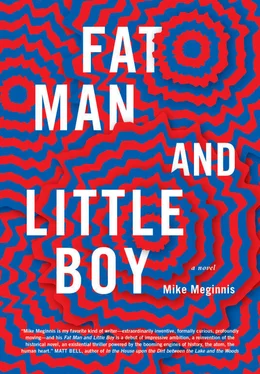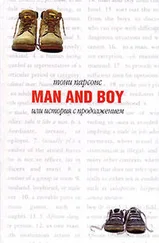He eats as much as he can because he wants to, because he still can, because he is so thin, and because he still needs to grow. Protein. Sugar. Carbohydrates. No fiber—he needs to keep it in.
He rolls around in bed.
He watches out the window.
He writes a letter to Claire.
He destroys the letter.
He sits at the hotel desk for six hours, drawing on the complimentary hotel stationery, anything he can remember.
He draws the nurse who carried him to the theatre.
He draws her kissing the man, her friend.
He draws a mask that watched them.
He draws a pig.
He draws a Japanese soldier using his foot to trigger his rifle.
He draws Mickey Mouse erasing himself.
He draws Fat Man scowling.
He draws Claire.
He draws Peter.
He draws naked breasts. Several pairs of different sizes.
He tears up his drawings and throws them out the window, where they fall like the snow.
He tries to masturbate and fails, looking out the window at the girls that pass, all bundled up for warmth. The eroticism of a scarf. The sexiness of thick socks.
Fat Man comes home with his exhausted wife in a wheelchair—they will be moved to a suite on the ground floor. He also has a baby. The baby is normal. She is wrapped in many layers of blankets, wearing a yellow hat. She has big eyes like marbles. Fat Man insists she is beautiful.
Fat Man says, “I have a daughter! A healthy, lovely daughter!”
Fat Man says, “You have a cousin!”
He offers Little Boy the baby. Little Boy will not hold the baby.
Instead Little Boy dotes on Rosie, who glows from lack of sleep and the layer of sweat and grime that builds on her as she goes days without bathing. He brings her glasses of water.
He watches her breastfeed. He sits and pretends to draw, or read one of the books Fat Man got him, facing perpendicular to her wheelchair or the bed, so that he can keep her in the corner of his eye. She is too tired for modesty.
Every morning Little Boy asks what is the baby’s name.
Fat Man says, “I don’t know.”
“What about Rosie Jr.?” asks Little Boy.
“That’s stupid,” says Rosie, breastfeeding.
Little Boy looks at her a little too long.
She says, “Keep your eyes to yourself.”
They drive home together. The baby has been named. It was Little Boy’s idea. He was looking down on her in Rosie’s arms.
Rosie said, “Would you like to hold the baby?”
This had been offered many times, and each time Little Boy said no.
Today he said yes.
The baby weighed six pounds. Little Boy never asked, but they told him. She felt lighter than that. He was surprised by how thin she was, by the way he could feel her bones through her baby fat.
He said, “She looks like a flower.”
“What kind?” said Rosie.
Little Boy brushed a hair from her forehead. “A magnolia.”
“Magnolia,” said Fat Man. “We’ll call her Maggie for short.”
Her name is Magnolia. Fat Man and Rosie let Little Boy hold her all the way home, in the back seat. He kisses her head. He lets her clutch his fingers in her little hands. When she messes herself he doesn’t complain, but breathes it in.
Maggie brings her picture to Cousin Matthew. It’s a picture of them playing with a dog. She wants to have a dog of her own.
Maggie says to Cousin Matthew, “I drew it!”
He takes the picture. “Why thank you. It’s just what I always wanted. Did you draw this?”
“I told you that,” says Maggie, rolling up her shirt in the front, showing her belly.
“It’s very beautiful. What’s this here?”
“A doggy,” says Maggie.
“Who’s this?”
“That’s you, Cousin Matthew.”
“I can tell by the hat. I look good. So who’s this pretty little girl in the yellow triangle?”
“Me!” She puts a curl in her mouth to suck the end and chew it.
“I guess you want a dog pretty bad.” Matthew knocks his hat skewed. “I bet we can get you one if you’re good.”
He touches her tummy. She pushes it against his finger the way it makes him laugh. He laughs for her the way she wants him to, squinting his eyes all squinty. She laughs back the way he likes her to. They go back and forth like that for a while, getting louder and louder, until she squats down and balls up the laugh in her tummy. Then she jumps straight up, rattling her knees, and laughs as big as a pirate.
“Jeez, you win, as always.”
“As always,” repeats Maggie. “As always, as always.”
“As always, as always,” she sings. “AS ALWAYS AS ALWAYS.”
As always there’s somebody new coming down the road to stay at their hotel. As always, nobody told Maggie new guests were coming. As always, they assume she’ll be okay to share the grass and the houses. There won’t be any kids or if there are then she won’t like them. If they have to fight it will be her fault, especially if she wins, AS ALWAYS.
The car stops close to the middle of the hotel grounds, near the kitchen. A big family piles out, which is not as always, but different. There’s a mom and a dad, and four kids get out of the back. The kids run around all over the place like little hellions. The dad has to threaten them a lot to make them line up single file. It’s not clear why they’ve got to line up that way. The dad takes a fifth kid out of the front seat. The fifth kid wiggles his legs a little like he wants to be let down. His dad holds him up though, rubbing his back, and the kid has his arms wrapped around the dad’s neck like a tight scarf. The kid looks wrong. Maggie can’t see why but she can tell she doesn’t like that kid. The other four seem okay. They watch their dad march the fifth kid into the cabin, where the mom is waiting with the door open. It’s like they’re the fifth kid’s audience. After the dad goes into the cabin the four kids in the line follow him, each getting a kiss from their mom as they go through the door. It all seems like a lot of work.
Maggie goes to the kitchen cabin. Her dad is making pancakes for lunch because she asked him to. She asks him if he knows what.
He says, “No, what?”
“There’s a new family.”
“Did we leave the door unlocked for them?”
She says they did. She asks, “What’s wrong with the fifth kid?”
“I don’t know, Maggie. I’ll find out if you promise not to be a rude little creature and ask.” He thinks a moment. “The fifth kid, did it look like he was the oldest?”
“Don’t think so,” says Maggie. “His dad carried him in. He was kind of big though.”
Maggie’s dad tells her to play outside until lunch time. She does. Cousin Matthew finds her and they play together; hide and seek. He always likes to be the hider, so, as always, she is the seeker, which is okay because she likes to seek. She is good at finding her cousin. He always leaves a clue for her. He’ll hide everything except his hat and let it peek out over the well, or whatever he’s hiding behind, like if he’s inside the car he’ll let his hat show through the car window, but it’s not always his hat. Sometimes he’ll cough or sneeze. It has to be a realistic clue—something that really might happen—or she’ll refuse to find him and he’ll have to stay hidden all day.
She finds him hiding in an outhouse. This time the clue is that he leaves his shoes hanging by their laces on the doorknob. “Found me. Just like a bloodhound.”
The lunch bell rings. Cousin Matthew says he’ll eat them all if he gets there first. Maggie hits him and laughs when he pouts like she hurt his feelings. She pretends not to believe him about his feelings. One time she made him cry and her mom wouldn’t let her have dinner. Her dad kept saying he was fine, he needed to toughen up, it wasn’t her fault Cousin Matthew took everything so damn serious. Her mom said she had to learn sensitivity. So it makes her mad when Cousin Matthew acts hurt because she knows it could put her in trouble. Cousin Matthew says, “You shouldn’t hit your cousin.” She wants to tell him not to take it so damn serious.
Читать дальше












